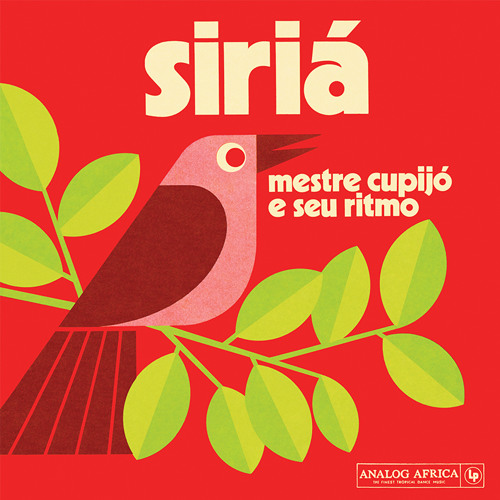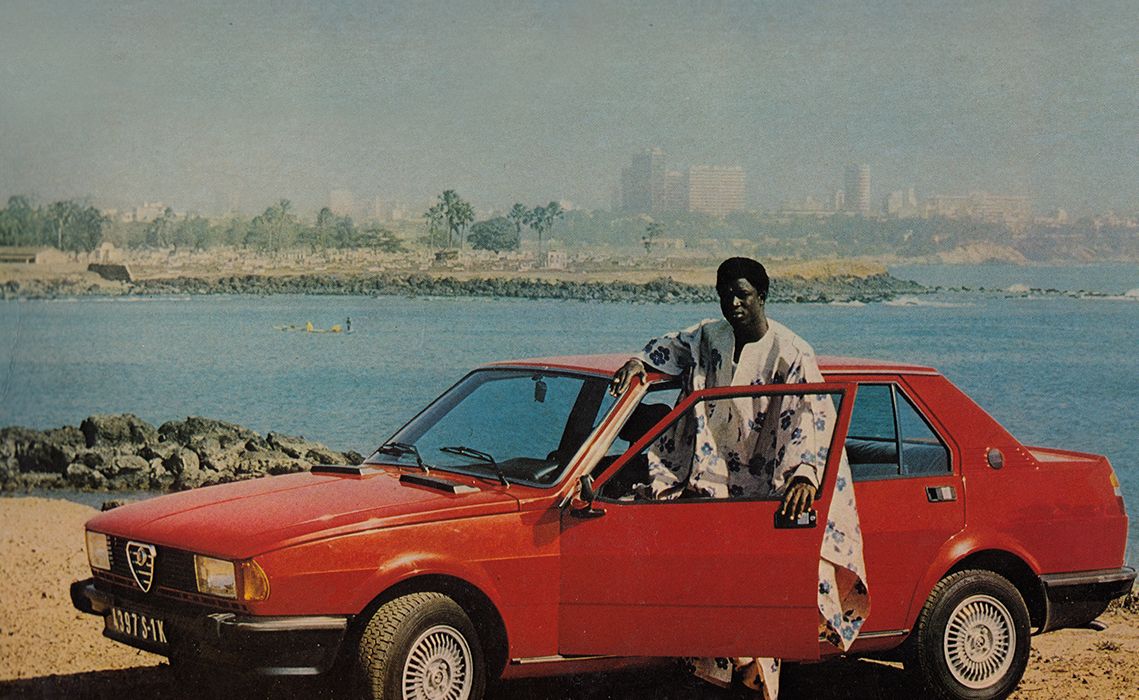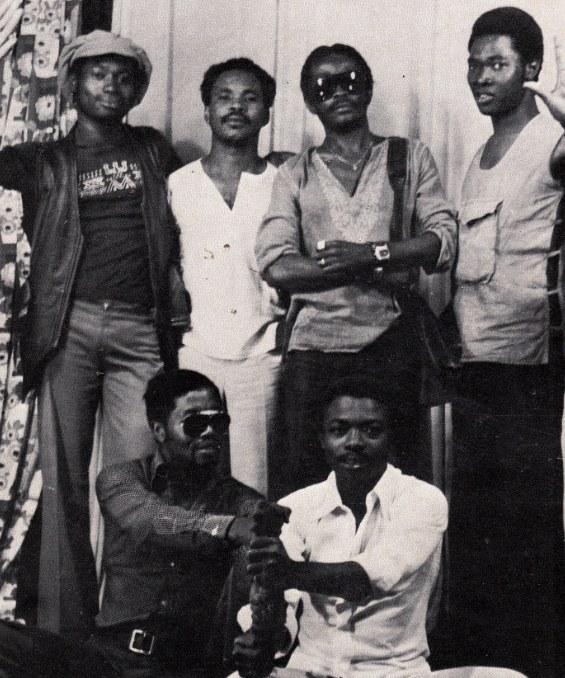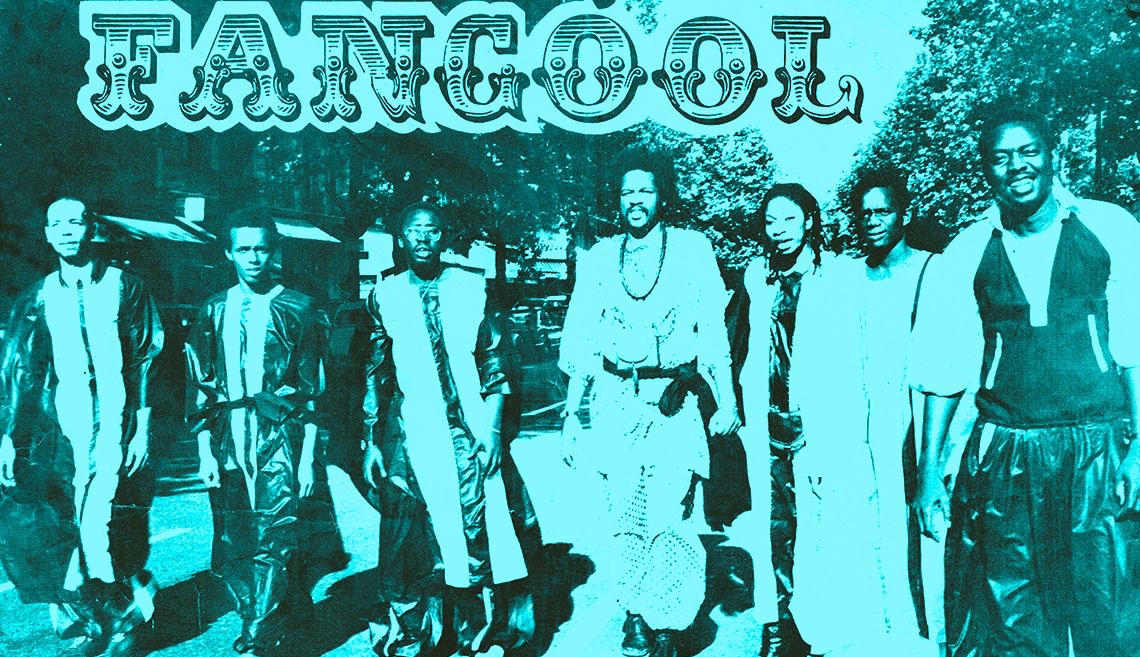Startseite › Foren › Die Tonträger: Aktuell und Antiquariat › Sympathy For The Record Industry: Die Labelkunde › Analog Africa
-
AutorBeiträge
-

Im September erscheint das nächste Album Afrobeat Airways 2, höchste Zeit also, diesem feinen kleinen Label einen eigenen Thread zu widmen.
Seit ca. 2006 veröffentlicht Analog Africa aufwändig gestaltete Compilations mit Musik aus Afrika und Südamerika. Längst verloren geglaubte Schätze, die in langen Reisen vor Ort gehoben werden. Die ausführlich gestalteten Linernotes beinhalten nicht selten auch Interviews mir den Originalinterpreten und sämtliche Tracks sind selbstverständlich lizensiert.
Discographie
01 The Green Arrows – 4 Track Recording Sessions
02 The Hallelujah Chicken Run Band – Take One
03 African Scream Contest – Raw & Psychedelic Afro Sounds From Benin & Togo 70s
04 Orchestre Poly-Rythmo de Cotonou – The Vodoun Effect
05 Legends Of Benin
06 Orchestre Poly-Rythmo de Cotonou – Echoes Hypnotiques
07 Anibal Velasquez y Su Conjunto – Mambo Loco
08 Afrobeat Airways – West African Shockwaves (Ghana & Togo 1972-1979)
09 Angola Soundtrack – The Unique Sound Of Luanda 1968-1976
10 Bambara Mystic Soul – The Raw Sound of Burkina Faso 1974-1979
11 Le Super Borgou de Parakou – The Bariba Sound 1970-1976
12 Diablos Del Ritmo – The Colombian Melting Pot 1960-1985
13 Orchestre Poly-Rythmo de Cotonou – The Skeletal Essences Of Afro Funk
14 Afrobeat Airways 2 – Return Flight To Ghana 1974-1983
15 Angola Soundtrack Vol.2 – Hypnosis, Distortions & Other Sonic Innovations 1969-1978
16 Mestre Cupijó e Seu Ritmo – Siriá
17 Verckys & Orchestre Vévé – Congolese Funk, Afrobeat And Psychedelic Rumba
18 Amara Touré 1973-1980
19 Senegal 70 – Sonic Gems And Previously Unreleased Recordings From The 70s
20 Space Echo – The Mystery Behind The Cosmic Sound Of Cabo Verde Finally Revealed
21 Legend Of Funaná (The Forbidden Music of The Cape Verde Islands)
22 Shadow – Sweet Sweet Dreams
23 Pop Makossa – The Invasive Dance Beat of Cameroon 1976-1984
24 Hamad Kalkaba and The Golden Sounds 1974-1975
25 The imaginary Soundtrack to a Brazilian Western Movie 1964 – 1974
26 African Scream Contest Vol.2 – Benin 1963-1980
27 Dur Dur of Somalia – Volume 1, Volume 2 & Previously Unreleased Tracks
28 Jambú e Os Míticos Sons Da Amazônia
29 Mogadisco – Dancing Mogadishu (Somalia 1972-1991)Limited Dance Edition
01 Orchestre Poly-Rythmo de Cotonou – The 1st Album (1973)
02 ROB – Funky Rob Way (1977)
03 Solo Hit – Imoikeme
04 Rebita – 1st Long Play recorded and pressed in Luanda in 1973
05 Vincent Ahehehinnou – Best Woman
06 Bro. Valentino – Stay Up Zimbabwe
07 Los Camaroes – Resurrection Los
08 António Sanches – Buli Povo!
09 Gyedu-Blay Ambolley – The Message
10 Orchestre Abass – De Bassari Togo
11 Ranil – Ranil y su Conjunto Tropical
12 Voz di Sanicolau – Fundo De Marê PalinhaLinks
--
Wann kommt Horst Lichter mit dem Händlerkärtchen und knallt mich ab?Highlights von Rolling-Stone.deWerbung
Afrobeat Airways 2 – Return Flight To Ghana 1974 – 1983
Tracklist
01 Uppers International – Aja Wondo
02 Ebo Taylor Jnr. – Children Don’t Cry
03 De Frank’s Band – Do Your Own Thing
04 The Cutlass Band – Obiara Wondo
05 De Frank and His Professionals – Waiting For My Baby
06 The African Brothers Band – Wope Me a Ka
07 Los Issufu and His Moslems – Kana Soro
08 Waza-Afriko 76 – Gbei Kpakpa Hife Sika
09 Rob – Loose Up Yourself
10 Tony Sarfo & the Funky Afrosibi – I Beg
11 K. Frimpong – Abrabo
12 Pierre Antoine and Vis-a-Vis – Say Min Sy Soh
13 Complex Soundz – God is LoveErscheint vorraussichtlich am 13.09.2013. Auf die Schnelle habe ich nur eine Überschneidung mit anderen Alben/Compilations gefunden: Robs Loose Up Yourself stammt von dessen 2. Album Make It Fast Make It Slow, das letztes Jahr von Soundway neu aufgelegt wurde. Ansonsten sind zumindest mir die Aufnahmen unbekannt.
--
Wann kommt Horst Lichter mit dem Händlerkärtchen und knallt mich ab?
Angola Soundtrack Vol.2 – Hypnosis, Distortions & Other Sonic Innovations 1969-1978
Tracklist
01 Os Angos – Avante Juventude
02 Quim Manuel – Senhor Doutor
03 Tony Von – N’Hoca
04 Urbano De Castro – Kia Lomingo
05 Jovens Do Prenda – Bina
06 Oscar Neves – Mabelé
07 Africa Ritmos – Agarrem
08 Os Kiezos – Saudades de Luanda
09 Kito – Bongololo
10 Muhongo – N’Ga Kunu M’Butu
11 Negoleiros Do Ritmo – Lemba
12 Dicanzas Do Prend – Snipes
13 Carlo Lamartine – Bazooka
14 Cisco – Divua Diami
15 Levis Vercky’s – Meca
16 Elias Diá Kimuezo -Chamavo
17 Africa Ritmos – Olha O Pica
18 Urbano De Castro – Fatimita
19 Africa Show – Inspiraçáo De Nito
20 Dimba Diangola – Despedida
21 Teta Lando – Fuguei Na Escola (Para Jogar A Bola)Der Nachfolger zum 2010 erschienenen ersten Teil erscheint voraussichtlich am 29.11.2013 als CD und 2LP.
--
Wann kommt Horst Lichter mit dem Händlerkärtchen und knallt mich ab?
Mestre Cupijó e Seu Ritmo – Siriá
Tracklist
01 Mingau de Açai
02 Mambo Do Martelo
03 Caboclinha Do Igapo
04 Tubarao Branco
05 Morena Do Rio Mutuacá
06 Papa Chibe
07 Farol Do Marajó
08 Cadé O Anel
09 Ventinho Do Norte
10 Siriá Quente
11 Eu Quero O Meu Anel
12 Perereca
13 Pra Dança Meu Siriá
14 Passarinho SiririDie nächste Veröffentlichung erscheint am 25.04.2014.
“
Cametá, a historical little Amazonian town on the shores of the river Tocantins, is the birthplace of the scorching music known as “Siriá”; a cross pollination between the music of the inhabitants of the quilombos, a Brazilian hinterland settlement founded by escaped slaves of African origins, and the indigenous people of the Amazon rainforest. It is a breathing, pulsing, emphatic beat, and the modernised version of this local music, created by Mestre Cupijó, has been igniting street parties and traditional festivals across the state of Pará in Northern Brazil for decades. And at last in 2014, the combustible sound of Siriá will be celebrated internationally as the feverish, tropical sound of the summer!Foretelling his talent to flow between cultures, Cupijó was named after a local river when he was born in 1936, into a family of musicians. His father, Mestre Vicente Castro, was also known as Mestre Sicudera, the musical director of Centennial Euterpe, one of Brazil ́s oldest bands, founded in 1874.
At 12, Cupijó started to play the clarinet. He also became proficient at the piano, mandolin and guitar, although the instrument that came to personify his sound was the alto saxophone. Waltz, bolero, cha cha cha and an assortment of dance hall music became part of Cupijó’s repertoire, but it was Carimbó and Siriá, the music played by the black communities of Pará, that had the strongest impact on the young musician.
To grasp the soul of this music, Cupijó went to its source and lived with the quilombolas (maroon) community of the Amazon. Upon his return, enriched by this life-changing experience, he founded the band „Jazz Orquestra os Azes do Ritmo“ with the goal of reinventing Siriá and modernising Samba de Cacete, Banguê and other folkloric music of the state of Pará. Airwaves from the Caribbean and Latin America had also brought the cumbia sound of the mighty Colombian orchestras, Merengue from the Dominican republic and Cuban music to the Amazon, all of which had an impact on the music of Northern Brazil, Mambo especially! Mestre Cupijó took these influences and mixed them in with the ingredients he had studied in the Quilombos. That fusion – as we are witnessing on this record – had explosive effects.
His fresh new sound became the soundtrack to Cametá’s legendary Carnival and soon his troupe were invited to other festivals along the river. Transportation to these concerts was via small boats, where three or four musicians would share a vessel with their instruments tucked between their legs. In those days there were no posters or radio adverts to promote the shows in any way, yet Cupijó’s shows became notorious. In an interview one of his band members explains: „Whenever there was a party – on a Saturday for example – and it was known that Mestre Cupijó would play, the news would spread incredibly fast, just by word of mouth. We didn’t understand how that was possible, but it certainly was amazing.“
After the initial wave of enthusiasm, the first two LPs were recorded with rudimentary equipment in a dance club in Cametá. However, it was the third attempt, recorded in a studio in Belém, which would trigger a phenomenal success. „Caboclinha Do Igapo“ and „Mambo do Martela“, included on this record, became instant hits. A year later, „Mingau de Açai“, one of Cupijo ́s most popular tunes, took the region by storm. In total six LPs were recorded by Mestre Cupijó.
He then created „Concurso de Musicas Carnavalesco de Compositores Cametaenses”, a contest for carnival music composers. The songs composed expressly for these contests in the 70s are still performed today during carnival season. In addition to evolving the Pará music culture in this way, he also owned a makeshift soundsystem, „Musicolor“, to spin the discs of local artists before his own shows to the frenzied crowds. Mestre Cupijó proved himself a philanthropist as well as a conductor for the people’s music, and acted as a provisional lawyer for the city of Cametá, specialising in help for the poor. He also had a short spell in politics and was elected by a vast majority to the station of Municipal Councillor of Cametá.
Master Cupjó, the pillar of Pará’s festive culture, and a humble pop icon who was ushered prominently into the country’s history books, passed away on 25 September 2012, at the age of 76.We at Analog Africa are ferociously proud and honoured to have the chance to present these carefully selected tracks from Mestre Cupijó’s six studio albums. We hope that his music captivates you with the magic and bewilderment that is has us. We recognise his compositions as true anthems of life and vitality, vibrantly encouraging all to drink and dance until sunrise! Let go of your inhibitions and immerse yourself in the wonderful world of Mestre Cupijó…….. Segura!!!
--
Wann kommt Horst Lichter mit dem Händlerkärtchen und knallt mich ab?
Verckys & Orchestre Vévé – Congolese Funk, Afrobeat And Psychedelic Rumba
Tracklist
01 Bassala Hot
02 Ya Nini
03 Cheka Sana
04 Oui Verckys
05 Nakobala Yo Denise
06 Sex Vévé
07 Sisa Motema
08 Talali Talala
09 Zonga Vonvon
10 Nakomi Paralise
11 Matinda ComonoDie 17. Veröffentlichung auf Analog Africa erscheint am 28.11.2014 und widmet sich kongolesichem Afrobeat.
“
At long last the legendary Congolese group, Verckys & l´Orchestre Vévé, receive a proper showcasing of their great rumba, funk and Afrobeat tracks of the ’70s. Verckys, a bandleader, composer and saxophonist, began his musical career in 1965 performing with the soukous band TPOK Jazz who dominated the Congolese music scene. It was in 1969 that Verckys left TPOK Jazz and formed l´Orchestre Vévé, who went on to become one of Zaire’s most successful acts. Verckys was also an ambitious business man who built an empire of labels, recording studios and clubs. Within the ’80s he abandoned the music scene, leaving behind a legacy of releases on labels including Sonafric, African, Albarika Store, Ngoma and his own label, Editions Vévé.--
Wann kommt Horst Lichter mit dem Händlerkärtchen und knallt mich ab?
Senegal 70 – Sonic Gems And Previously Unreleased Recordings From The 70s
Tracklist
01 Mariama
02 Africa
03 Thiely
04 Bour Sine
05 Viva Marvillas
06 Massani Cisse
07 El Carretero
08 Kiko Medina
09 Kokorico
10 Ndiourel
11 Ma Penda
12 Sanga TeDer nächste Analog Africa Release erscheint am 27.11.2015.
4 years in the making, in partnership with Teranga beat the current leading label for Senegalese music, Analog Africa proudly offers an insight into the musical adventures that were taking place in the major Senegalese cities during the 60s and 70s. This compilation, reflects the unique fusions of Funk, Mbalax, Cuban Son and Mandigue guitar sounds that transformed Dakar into West Africa´s most vibrant city. TIP!!
It all started in 2009 when Adamantios Kafetzis travelled from Greece to Senegal with a brand new tape machine that he used to digitise the musical treasures he had discovered in the city of Thiés. These treasures took the form of reel tapes, and had been recorded by sound engineer Moussa Diallo, who had spent the previous four decades immortalising, onto magnetic tape, the bands that would perform in his club, the legendary Sangomar.300 Senegalese songs that nobody had ever heard before were discovered –
five of them were selected for this compilation.Thanks to its history of outside influences, Senegal – the western point of Africa – had become a musical melting pot.
Cuban and American sailors had brought Son Montuno from Cuba, Jazz from New Orleans and American soul tunes: sounds that were swiftly embraced and adopted by urban dance bands and intuitively merged with local music styles.One band in particular excelled at this fusion. 1960 marks the formation of Star Band de Dakar, a milestone that left an
indelible imprint on Dakar’s musical landscape. Indeed, the whole country was soon grooving to their intoxicating mixture of Afro Cuban rhythms and Wolof-language lyrics.The 1970s brought a new generation of stellar bands;
Le Sahel, Orchestre Laye Thiam, Number One de Dakar, Orchestra Baobab, Dieuf Dieul de Thies and Xalam1 who fused traditional Senegalese percussion instruments such Sabra, Tama and Bougarabou with organs and keyboards, giving birth to new hybrids. Merging the folkloric and the experimental, these sounds, embraced by the youth, took centre stage and gave the previously dominant Cuban music a run for its money.With this burst of musical and artistic creativity, driven predominantly by the modern vision of President Senghor, Dakar
began attracting international stars. The Jackson Five, James Brown, Tabou Combo (Haiti), Celia Cruz (Cuba) and an array of African stars like Tabu Ley Rochereau (Congo), Manu Dibango (Cameroon) and Bembeya Jazz (Guinée) joined in with the local scene, improvising jam sessions and bringing new flavours to a music scene that was always open to new inspirations and influences. Johnny Pacheco immortalised his passion for the city with a song called “Dakar, Punto Final”.The comprehensive booklet that comes with the CD – 44 pages and with the Double LP – 12 pages LP size – is a precious
document attesting to the decades of transformation that led to modern Senegalese music. Featuring biographies of music producers and a legendary record cover designer, as well as the life stories of all the groups represented here, the booklet also includes a fantastic selection of photos that have never seen before.--
Wann kommt Horst Lichter mit dem Händlerkärtchen und knallt mich ab?klingt einmal mehr faszinierend!
--
"Don't play what the public want. You play what you want and let the public pick up on what you doin' -- even if it take them fifteen, twenty years." (Thelonious Monk) | Meine Sendungen auf Radio StoneFM: gypsy goes jazz, #170: Aktuelles von Jazzmusikerinnen – 19.02.2026, 20:00; #171 – 10.03.2026, 22:00; #172 – 14.04.2026, 22:00 | Slow Drive to South Africa, #8: tba | No Problem Saloon, #30: tba
soulpope "Ever Since The World Ended, I Don`t Get Out As Much"Registriert seit: 02.12.2013
Beiträge: 57,342
sparch

Senegal 70 – Sonic Gems And Previously Unreleased Recordings From The 70s
Tracklist
01 Mariama
02 Africa
03 Thiely
04 Bour Sine
05 Viva Marvillas
06 Massani Cisse
07 El Carretero
08 Kiko Medina
09 Kokorico
10 Ndiourel
11 Ma Penda
12 Sanga TeDer nächste Analog Africa Release erscheint am 27.11.2015.
klingt gut – und den Track 06 habe ich schon mal im „globalen Thread“ eingestellt ….
--
"Kunst ist schön, macht aber viel Arbeit" (K. Valentin)
soulpope "Ever Since The World Ended, I Don`t Get Out As Much"Registriert seit: 02.12.2013
Beiträge: 57,342

Ein weiterer Taster der Cover Art …. den Download habe ich auch bereits, aber noch nicht gehört ….
--
"Kunst ist schön, macht aber viel Arbeit" (K. Valentin)Welchen Download?
--
Wann kommt Horst Lichter mit dem Händlerkärtchen und knallt mich ab?
soulpope "Ever Since The World Ended, I Don`t Get Out As Much"Registriert seit: 02.12.2013
Beiträge: 57,342
sparchWelchen Download?
Ich habe vor einem Monat – glaube ich erwähnte das eh schon – den Mystery Track bei einem Analog Africa Online Gewinnspiel erkannt und einen MP3 Download des gesamten Albums gewonnen, welchen ich heute erhalten (also rund 2 Monate vor der offiziellen Veröffentlichung) erhalten habe ….. bei der Cover Art erhielt ich ein paar Photos und das Front Cover, bezüglich der Tracks habe ich die einzelnen Tracks mit Titel, aber ohne Artist …. muss ich halt „nachhören“ ….
--
"Kunst ist schön, macht aber viel Arbeit" (K. Valentin)
soulpope "Ever Since The World Ended, I Don`t Get Out As Much"Registriert seit: 02.12.2013
Beiträge: 57,342
Noch mehr Cover Art :

Orchestre Laye Thiam

Orchestre Fangool
--
"Kunst ist schön, macht aber viel Arbeit" (K. Valentin)Senegal 70 gibt es seit heute auf Bandcamp.
Vinyl dauert allerdings noch, kann aber vorbestellt werden.
--
Wann kommt Horst Lichter mit dem Händlerkärtchen und knallt mich ab?
soulpope "Ever Since The World Ended, I Don`t Get Out As Much"Registriert seit: 02.12.2013
Beiträge: 57,342
sparchSenegal 70 gibt es seit heute auf Bandcamp.
Vinyl dauert allerdings noch, kann aber vorbestellt werden.
guter Stoff ….
--
"Kunst ist schön, macht aber viel Arbeit" (K. Valentin)Vinyl (DoLP) kommt jetzt am 01.02.2016.
Wenn man über Bandcamp bestellt, bekommt man den Download kostenlos dazu. Ariyo von Dieul Dieul de Thiès gibt es nur in der Download Version, auf CD und 2LP befindet sich stattdessen Gestü de Dakar mit Ndiourel.
--
Wann kommt Horst Lichter mit dem Händlerkärtchen und knallt mich ab? -
Du musst angemeldet sein, um auf dieses Thema antworten zu können.